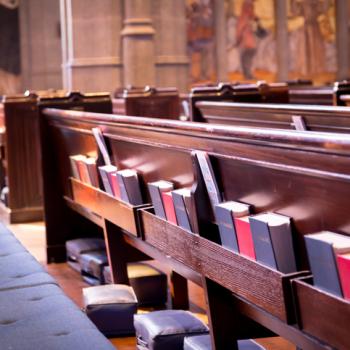Louisville, We Have a Problem
Albert Mohler is one of the conservative lions of the Southern Baptist Convention (SBC). Since he assumed the presidency at The Southern Baptist Theological Seminary (SBTS) in Louisville, KY, Mohler has led the seminary to turn sharply to the right on theological, social, and political issues. Long reviled by moderate and progressive Baptists, Mohler has portrayed himself and SBTS as guardians of conservative orthodoxy in the SBC, protecting the faith from the onslaught of liberalism and cultural insanity.
In his article Heresy and Humility, Mohler writes, “I have spent my entire adult lifetime concerned with the danger of heresy. As a young theologian, I worked through the early centuries of church history and understood that knowing the difference between orthodox Christianity and heresy is really a matter of life and death for the Church. A failure to recognize heresy means disaster for the Church and its witness to Christ.”[1] His image as a conservative protector of orthodoxy is almost impregnable.
Images of Protection
What if, however, that image is just an image? What would it mean if Mohler had someone on staff who denied critical doctrines of the Christian faith? Can a guardian of orthodoxy knowingly and willingly employ professors who reject key portions of the orthodox Christian faith?
Bruce Ware
Bruce Ware is the Chair of the Department of Christian Theology at SBTS. A widely published author, Ware is well-known in evangelical theological circles. His reputation, however, is not exactly what SBTS thinks it is. Ware has been at the forefront of debates about gender roles and the doctrine of the Trinity. He has also made eye-opening, disturbing comments about the nature of Jesus Christ, testing the limits of orthodoxy.
Nicaea and Eternal Generation
The Nicene Creed’s language, summarizing what the Bible teaches, says, “… I believe in one Lord Jesus Christ, the only Begotten Son of God, begotten of the Father before all ages…” The doctrine of Eternal Generation is about who Jesus is. Jesus is the only begotten of the Father. When was Jesus begotten? “Before the ages,” which is a way of saying before time in eternity. The Father begets Jesus eternally. In this begetting, Jesus has everything that God has. Jesus is God. He is not similar to God, Jesus is God. Every characteristic God has, Jesus has. Jesus is “…Light of Light; True God of True God…”
Since Jesus is eternally begotten, Jesus has always been. The Athanasian Creed puts it this way, “Nothing in the Trinity is before or after, nothing is greater or smaller; in their entirety the three persons are coeternal and coequal with each other…”
Ware denied this doctrine. From 1999, when he was first employed at SBTS, until November 2016, Ware publicly argued against the Eternal Generation of Jesus Christ.[2] In 2005 Ware wrote, “The conceptions of both the ‘eternal begetting of the son’ and the ‘eternal procession of the Spirit’ seem highly speculative and not grounded in biblical teaching.”[3]

It is Heresy
Denying the eternal generation of the Son is outside the bounds of Nicene Orthodoxy. That is not just my verdict, it is Al Mohler’s verdict. He writes, “…Based on the Nicene Creed, theologians have affirmed the Eternal Generation of the Son, making it clear that there never was a time when the Son was not…”[4] Denial of the Eternal Generation is outside orthodox Christianity. To be very clear, this is not only my judgment, the Church Father’s judgment, or even the Reformers’ judgment that denial of Eternal Generation is heresy. It is Al Mohler’s judgment.
Nicaea and Wills in God
When speaking of God as a Trinity, modern language is a problem. In contemporary usage, the term “person” means a center of consciousness and will. With regard to the Trinity, however, this definition leads one astray. In God’s eternal being, there is only one nature, one will, and one center of consciousness. To have multiple wills is to have multiple beings–multiple “gods.” Multiple wills is a heretical concept, by definition.
As late as 2011 Bruce Ware affirmed there are three centers of consciousness and will in God.[5] Not only is this position outside Nicaea, but the Church has historically called it heresy. More than that, Mohler himself calls this a heretical position. He writes, “…Affirming three separate wills within the Trinity would be heresy…”
Mohler
Mohler is indeed very concerned with doctrinal orthodoxy at SBTS. When a new professor is hired, he must sign the Abstract of Principles. Among the doctrines in the Abstract are: a Reformed doctrine of Election and Perseverance of the Saints. Another important emphasis for Mohler is the Role of Women. For example, there are no women professors in the School of Theology.
Stunningly, Mohler is adamant that a woman may not teach New Testament Greek, but would allow a professor to hold to two heretical concepts to be a department head at SBTS.
Defending Ware
Worth noting is that Mohler’s article Heresy and Humility is a defense of Ware and Wayne Grudem who shares many of Ware’s views. In this article, Mohler gives extensive detail on the nature of heresy, why defending orthodoxy is important, and defends Ware’s doctrine of Eternal Submission of the Son from the charge of heresy. Mohler is likely wrong on this point, however, he is right to call two wills in the Godhead and the denial of Eternal Generation heresy.
The date of the article is worth noting as well. Mohler published it on June 28, 2016. What is disturbing is that Ware denied Eternal Generation of the Son, at least in public, until November 2016. Ware was holding a heretical position at the time Mohler was defending him.
Mohler is a theological conservative, an architect of the SBC’s “Conservative Resurgence.” If, however, Mohler is not conserving orthodoxy, what exactly is he conserving? It looks like “conservative” means holding to inerrancy and holding to conservative social and political views. Mohler gives lip service to conserving orthodoxy.
Why?
The mind is an impenetrable thicket. Knowing one’s own mind is difficult enough, knowing the mind of another is nearly impossible. Knowing, then, why Mohler tolerated heresy at SBTS from 1999-2016 is difficult to ascertain.
What can be known is that Ware supports certain roles for women. Ware uses the doctrine of the Trinity to argue for the subordination of women to men. His novel and bizarre logic is that Jesus is subordinate to God throughout eternity and that Jesus’ subordination to God should be the image of male-female relationships on earth.[6] In his views of gender roles, he fits well within the ethos of SBTS. For those of a complementarian bent, his work is central.
Gender
It is possible to conclude Ware’s work on gender is why Mohler has kept him. It is probably not credible to conclude Mohler was unaware of Ware’s position on multiple wills and Eternal Generation. Perhaps Mohler sees nuance in Ware’s work that would place him back in the orthodox camp. That, however, seems dubious as well.
For whatever reason, the guardian of orthodoxy at SBTS has tolerated heretical teaching from a department head. Mohler is right, heresy is not just about words. Heresy is a matter of life or death for the church. Knowing that, he employed Ware.
Louisville, we have a problem.
Layne Wallace on the SBC and the Creed
[1] https://albertmohler.com/2016/06/28/heresy/
[2] Ware recanted his teaching on the matter in 2016 at the meeting of the Evangelical Theological Society.
[3] Bruce Ware, Father Son, and Holy Spirit: Relationships, Roles, and Relevance. (Wheaton, IL: Crossway Books, 2005), 162.
[4] https://albertmohler.com/2016/06/28/heresy/
[5] https://wyattgraham.com/how-wayne-grudem-and-bruce-ware-argue-for-eternal-relations-of-submission-and-authority-in-their-own-words/
[6] The doctrine is called Eternal Subordination of the Son, Eternal Filial Subordination, or Eternal Relations of Submission and Authority.















